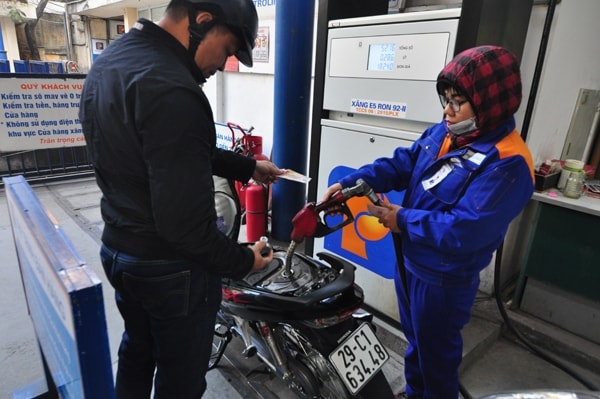Ethanol in E5 gasoline affects some old car models
The Ministry of Industry and Trade responded to a series of articles warning that older car models may be affected when using ethanol gasoline.
After the press published a series of articles reflecting concerns that ethanol fuel may affect some older car models, the Ministry of Industry and Trade has officially responded to this information. In it, it recommends that customers using older car models when using ethanol fuel should consider replacing pipe parts made from natural rubber with synthetic rubber materials with higher durability.
 |
| Although widely sold in Vietnam, the percentage of people driving cars and motorbikes using E5 gasoline is still modest. |
Some older vehicles may not be compatible with ethanol.
The Australian Automotive Chamber of Commerce (FCAI) - the organization representing Australian automobile and motorcycle manufacturers and importers has conducted very specific research on the use of ethanol fuel on different vehicle models and models, and at the same time recommends not using it on some older automobile and motorcycle models, including many similar models currently in circulation in Vietnam.
| Accordingly, FCAI's research report listed a series of car models that are not suitable to run on E5 or E10 gasoline. Specifically, cars and motorbikes that are not compatible with E5 gasoline include: Audi A3 1.8L produced before 2000; Ford Laser produced before 1986 and some models produced between 2002 and 2004; All GM Daewoo cars; All Mazda cars except Mazda2 produced in February 2005, Mazda3, Mazda6, RX8, MX-5 produced in July 2005 and from April 2006 onwards; All Suzuki cars produced before 2008; Toyota Camry with jet engine produced before July 1989 or Toyota Hilux, Toyota Hiace produced before August 1997... For motorcycles, many old models of Honda and Yamaha are also on the list of incompatible with E5 gasoline; Many Kawasaki motorcycle models also have similar results... Vehicles that are not compatible with E10 gasoline: Ford Focus models from 2002 - 2004, Transit from 1996 - 2004, Modeo from 2007; Lexus IS200 manufactured in May 2002; Peugeot 306 (XU engine); Many Subaru models from 1990 - 2005... Some motorcycle models that are not compatible with E10 include: Ducati, Honda, Yamaha... |
On December 22, the Ministry of Industry and Trade also officially responded to the related information. Responding to the authenticity of the information in the FCAI study reported by the press, the Ministry of Industry and Trade said that biofuels have been widely used in countries around the world. To date, more than 60 countries and territories in the world have used biofuels.
To put biofuel into practical use, scientists around the world have conducted many research projects on physical and chemical properties, environmental impacts as well as experimental studies on different types of engines and evaluated the impacts of this fuel on engines, engine parts...
The evaluation research published in the Australian article is not outside of previously published works. The highlight of this work is that it has specific research on some old car models, providing useful information for users of biofuels E5, E10.
However, it is necessary to understand correctly the information that the article has provided, recommending customers when using biofuel (E5, E10) for old car models, manufactured in the 1980s and 1990s of the last century.
The article has provided information for customers using old car models when using E5, E10 gasoline without any changes in engine details, other old car models that want to use need to consider or replace some parts of the fuel pipes before using E5, E10. The article also affirms that when using biofuels with ethanol concentration less than 10% (E5, E10), there is absolutely no corrosive effect on the engine.
“In Vietnam, scientists have also made recommendations to customers using old car models (manufactured before 1993 of the last century), when using biofuel (E5, E10), they need to consider replacing natural rubber pipe parts such as carburetor accelerator pumps, sealing rings with synthetic rubber materials with higher durability. For details, people can refer to the “Biofuel Handbook” posted on the website of the Ministry of Industry and Trade, said a representative of the Ministry of Industry and Trade.
Tested on several vehicle models
Responding to the reporter's question, before being put into mass use, how was ethanol gasoline tested in Vietnam? What were the test results? Regarding this issue, the Ministry of Industry and Trade said: In Vietnam, a number of studies on the potential impact of biofuels (E5, E10) on engines have been conducted at a number of major universities. One of the systematic and comprehensive studies was conducted at the Institute of Dynamics Research (Hanoi University of Science and Technology).
In which, the studies were conducted in the laboratory, field studies, the research subjects were some types of cars, motorbikes, evaluating the technical features of vehicles when using biofuel, compatibility of materials in engine parts for biofuel, emissions...
Test results have shown that using biofuel is completely safe for engines, increases engine performance, and significantly reduces emissions that pollute the environment such as CO, HC... compared to conventional mineral gasoline (because ethanol contains oxygen, the fuel burns more completely).
Traffic Newspaper
| RELATED NEWS |
|---|


